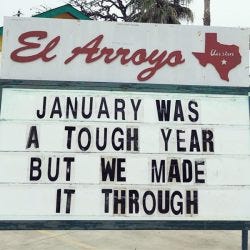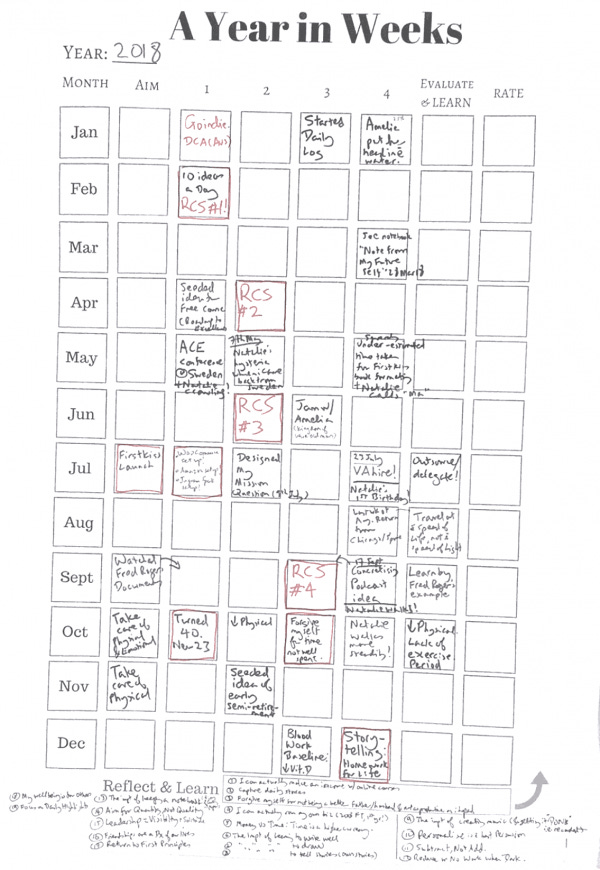Private Thoughts: Looking Back In Order to Move Forward (Part I of II)
Updates by Daryl Chow, MA, Ph.D.(Psych)
View this email in your browser
Private Thoughts: Looking Back In Order to Move Forward (Part I of II)
By Daryl Chow, MA, PhD on Feb 06, 2019 05:50 pm
I haven’t been able to hit publish for the past several weeks. I feel crippled by some intense glass walls. These walls seem to have voices that utter, “It’s not good enough,” “That’s nothing new,” “Look at all the typos,” “Who wants to read your sh*t?”
Turns out, these glass walls were fictitious—like this invisible tape.
Coupled with doubts, I was also experiencing a big diffusion of focus. I wrote some blog posts, but I just couldn’t put my head down to finish them. Plus, while trying to capitalise on the “fresh start” effect of the new year, I suspect I front-loaded too high an expectation on myself to get stuff up in the air. (And we know by now, New Year’s resolutions don’t work).
Another problem I could pinpoint: I had too many planes with too little runway. If I was an airport, it would like a scene from doomsday. With no traffic controller in sight, it was mayhem. And I was worn out.
~~~
The late poet Mary Oliver said that she would insert the “I” in her poems to see if her experience can be shared while the readers place themselves in her “I’s”. As I’m writing this, I’m making a pact to myself, to put this out there, and see if this reaches you in some ways. (As you will see, this is a much longer post than usual. It has two parts. Below is about the “Personal” side of things. In the next post, it would be on the “Tactical” side of what I’ve learned from the past year).
Instead of making resolutions for the new year, I took the first 3 weeks of January to gaze back at 2018. Early last year, I made an A1 size blow-up poster called “A Year in Weeks“. I wanted to be able to capture key moments and have a tangible way to reflect and learn from specific events, and not just from a tainted recall perspective.
I stared at this poster for some time before I could get a handle on all that has happened in the span of a year. I kept looking at them until it penetrated my thick skull (and curly hair) what I can learn from these events. (see the scribblings at the bottom of the poster above).
(I’m aware that not everyone on the Frontiers of Psychotherapist Development list is going to find this post useful. Skip this, and don’t feel bad about it. No need for this to be on your to-do list.)
Here are five of the relevant ones that I’ve extracted from my 2018 experience on a personal side of things…the bliss and the blisters.
PERSONAL
1. Forgiving myself for not being a better father/husband.
One of the glaring consequence of my work and myriad pursuits, or whatever you want to call it, is that I’ve become Mr. Grouch with my family. After a day’s worth of intense work, I’ve expended way beyond my units of energy available in my body, and I get home either with left-over drips of fuel left in me, or I would come home utterly depleted.
Because of this, try as I may, I’m unavailable to my wife and kids. It’s a horrible feeling. The double whammy is that I feelbad about this.
But I realised, in a visceral sense, I need to forgive myself. I need to allow myself to try again… and I bet I’d fail again, but I’d try again.
To make this work, I need to make sure I don’t go home with left-over units of energy.
2. Forgiving myself for not being as productive as I’ve hoped
The irony about forgiving myself for being Mr. Grouch with my family is that I’m also not as productive as I hoped to be in 2018. In part, looking back at last year, I spent too much time hesitating. Also, I realised I’ve fallen into a common trap of planning fallacy, that is, thinking I can complete a task with an overly optimistic timeframe. History has it that I’m wrong more than 80% of the time.
And I used to get so pissed with myself for this. What I’ve learned to do is to build it into my schedule some “buffer” time. That is, if I think a project will take 1 hr, I’d multiply that by 1.5 (hat-tip to Cal Newport), and I make sure it exists not in a to-do list, but in my calendar. It isn’t foolproof, but it’s an improvement, plus I get to breathe a little deeper.
3. Friendships as a diagnosis of our lives
Being in a foreign country meant that my old friends (who are still very young at heart), are not here. Plus, given the coupling of business life and family life, friendships moved to the sideline.
But it struck me when I was listening to poet David Whyte talk about friendship. “Our friendships are a diagnosis of our lives,” he said.
Thankfully, I have a close friend here. We handshaked that we should meet routinely and jam, even though we both have mouths to feed and jobs to keep. I’m so thankfully so such deep friendships.
4. My wellbeing is for others
A few months ago, I decided to get a full blood work to see how my health was doing. I didn’t go to see a default general medical practitioner, as I wanted someone who was trained in functional medicine. This was all new to me.
So I got my results back, still feeling guilty for spending all that money on myself. No big alarm bells, but like 73% of the population in Australia, I was vitamin D deficit (check out Dr. Holick’s book this topic if you are interested).
Maybe it’s because I just turned 40, but it dawned on me that my health wasn’t really for me, it was for my wife and kids. I need to stay in shape in order to hang around, and continue to be part of their lives. I need to have the energy to run around and carry my daughters without breaking my back.
5. Mind my own business
January 2018 was the first time I stepped out of employment and decided to go indie. Though I’m still under contract with the mental health institutation I formerly worked in Singapore, I left my role as a clinical manager in Australia, and continued my 2-day private practice, and began to devote more time for coaching, consulting, teaching (in non-academic settings), writing and researching.
I can’t emphasise enough how foreign and scary a world this was to me, especially given that I was the only person in the family bringing home the bacon in a Aussie land. I was pampered for far too long. I think was I insulated—or rather, institutionalised—and didn’t need to worry about money and business stuff for far too long.
By the end of 2018, I realised I couldn’t get my head around doing a handful of projects that I would have wanted to do. On the other hand, I was taken by surprise that the inception of Reigniting Clinical Supervision, an online course that I created took off (took me a year prior to build that up). Now in its 5th batch, the learning journey with various practitioners around the world has been nothing short of phenomenal, and frankly, so inspiring. Because I designed the course to be aligned with my business model, which is to not to upscale, but to “reverse” scale—which means, to be able to keep the business entity small and rigorous, while serving a group of motivated individuals in a personal way—I felt really good about it. I didn’t want to create a bunch of content, and they dump them and let it to learners sort it out themselves. Instead, the course was designed to “drip” one idea a time, and I provide guidance and interaction each step of the way. The payoff from connecting with all these individuals is priceless.
July 2018 saw the launch of the book, The First Kiss. That nearly killed me. Because I made the decision to not go to a traditional publisher and take on a small indie-publishing umbrella called Correlate Press, besides hiring a few true professionals, I basically did everything from scratch on my own. The reason I did this because, like the world of music where musicians are now able to reach and connect with their audience directly, I don’t see the need to go through a middleman anymore. I was curious to find out, what happens if we by-pass the middleman? Plus, I would get full control of the manuscript, cover art design, types of paper used, royalties, etc. (Actually, I’m now making edits to the book, and re-releasing them for the 2nd edition). I also gave the same level of scrutiny to the book the way it would be with any traditional publisher. I hired a professional editor (someone outside of the field, so that I would get away with jargons) and a cover designer. I had many eyes on the manuscript to point out stuff that I couldn’t see, etc. But what nearly killed me was the formatting the ebook. It took me nearly two weeks to learn and to DIY the formatting. If I was to do this again, I would bite the bullet and hire someone else to do it.
Would I collaborate with a traditional publisher in the future? Actually, I would. In fact, our next book is with a reputable publisher! But given what I’m learning about the world of publishing, indie or self-publishing is no longer connotative of lower standards. I mean, the Martian and 50 shades of grey were self-published!
~~~
If you have read this far, thanks for sticking around. I love to hear about your learnings in 2018.
Stay tuned for Part II on the tactical side of things that I’ve extracted from 2018.
~ Daryl
The post Private Thoughts: Looking Back In Order to Move Forward (Part I of II) appeared first on Frontiers of Psychotherapist Development.
Recent Articles:
What It Means to Be At The Frontier
What Does General Athleticism Got to Do With Psychotherapeutic Skills?
Instead of The “10,000” Hour Rule, Why Not The “60” Hour Rule?
How Do You Grow as a Clinical Supervisor?
A System of Practice: Creating a Framework To Make Deliberate Practice Happen (The Complete Talk at Achieving Clinical Excellence Conference, Sweden 2018).








